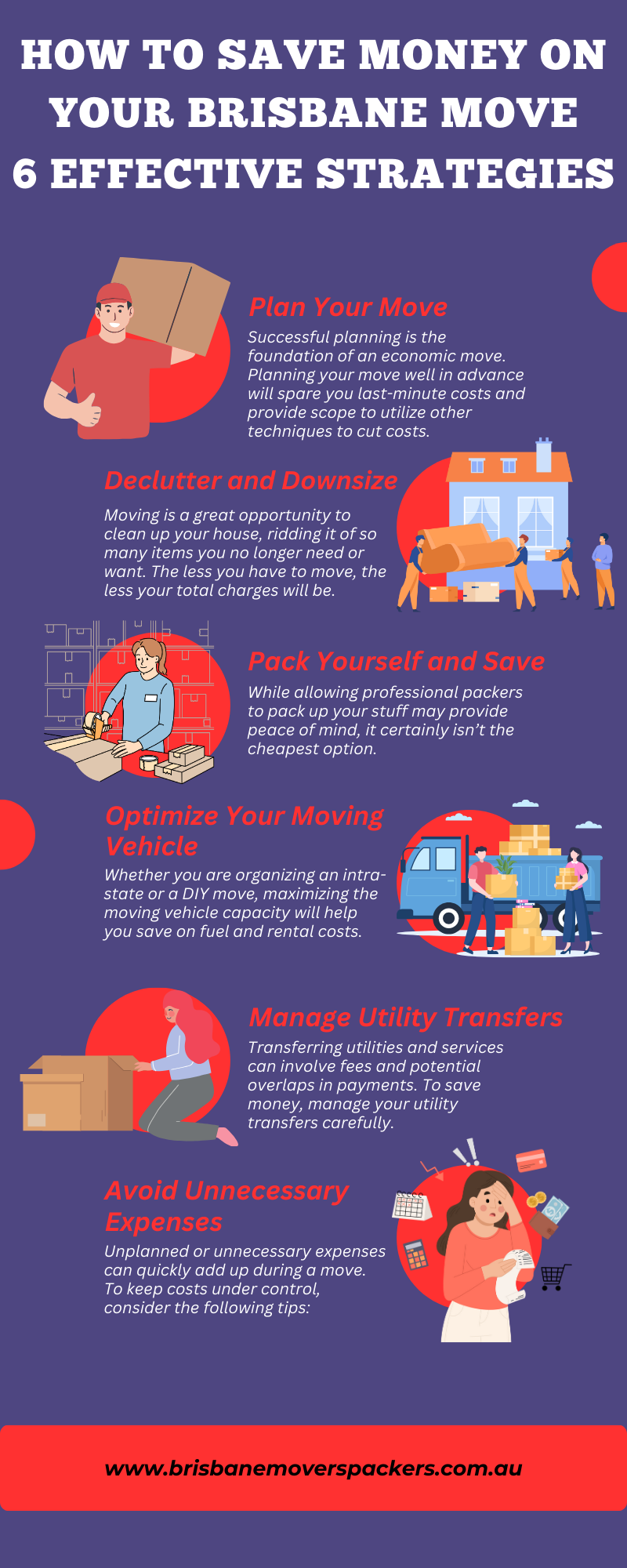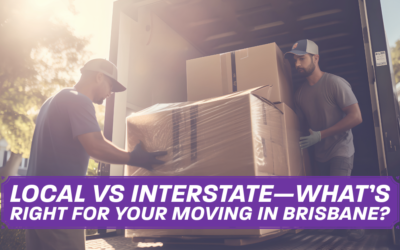Although moving to a new place is a very exciting chapter in your life, it’s usually pretty expensive. From professional removalists and packing supplies to unexpected costs, all these expenses usually pile up pretty fast. However, with some strategic planning and smart decisions, it is possible to manage your moving budget. The following article will detail six practical ideas to help you save money when moving to Brisbane without a hassle.
1. Plan Your Move Strategically
Successful planning is the foundation of an economic move. Planning your move well in advance will spare you last-minute costs and provide scope to utilize other techniques to cut costs.
a. Book Removalists Early
Booking removalists can snowball savings for you. Besides the early reservation discounts that many removalist companies offer, a no-delay booking for your chosen moving date ensures that you avoid the higher rates of the peak moving season.
- Research and Compare Quotes: Research several removalist companies and compare quotes in Brisbane. Check with a minimum of three varied providers that the quotes represent all the additional potential costs: packing, transporting, and various other types of services.
- Negotiate Rates: Do not hesitate to bargain with the removers. If you have gotten a better quote from somebody else, then ask your preferred provider to match up or beat the price for you. This will help you get the best deal.
b. Choose Off-Peak Times
In peak times, like summer or the end of the month, moving can be pretty expensive. Provided the conditions allow for it, plan your move for the off-peak season and enjoy more affordable charges. Moving during the middle of the week or in the middle of the month mostly ensures lower costs.
c. Create a Moving Timeline
A good moving timeline will keep you organized and not chaotic, and it’s going to stop you from these last-minute expenses. Using a detailed schedule of essential tasks, such as the following, will help: packing, hiring removalists, and transferring utilities. This will let you monitor your time properly to avoid rushed decisions that would bring other added costs.
2. Declutter and Downsize
Moving is a great opportunity to clean up your house, ridding it of so many items you no longer need or want. The less you have to move, the less your total charges will be.
a. Sort and Purge
Go through every room in your living space and sort the items into the keep, donate, sell, or trash categories. Be honest with yourself in regards to what you need and are using. If you haven’t used something in the last year, it’s probably time to let it go.
- Host a Garage Sale: Conduct a garage sale for any items you no longer need. This will go a long way in decluttering your space and also allow you to make additional money for relocation.
- Sell Online: Post any unwanted items or products on online platforms such as Facebook Marketplace, Gumtree, and eBay. You can also easily sell furniture and home appliances online.
b. Donate to Charity
Charitable donations make you feel as though you have done some good, and most charities even offer free pickups, which will save you the time and expense of doing it yourself. Most donations are also tax-deductible, so it’s a double whammy.
c. Reduce Moving Volume
By minimizing the volume of the product you have to take with you, you can reduce all the packing, moving, and storage costs. Fewer things mean fewer boxes and a smaller moving truck, which adds up to a lot of money in the end.
3. Pack Yourself and Save
While allowing professional packers to pack up your stuff may provide peace of mind, it certainly isn’t the cheapest option. With a little planning and organizational work, you can pack efficiently and save in your pocket.
a. Gather Free Packing Supplies
Instead of buying new packing materials, search for free supplies. You will find free boxes at many local businesses and grocery stores, especially online marketplaces. Use towels, blankets, and clothing for padding fragile items.
- Check with Local Businesses: Check with local stores or offices if they have extra boxes or packing material to spare. Quite frequently, they do have an excess of supplies they would willingly give away.
b. Pack Smartly
Well-packed is a method of reducing the risk of damage and the volume of objects that need to be moved. Some tips on smart packing are as follows:
- Use the Right-Sized Boxes: Use appropriate-sized boxes for different kinds of items. Smaller boxes should be used for heavier things like books, but the bigger boxes are more suitable for lighter articles like linens.
- Label and Organize: Properly label each box with its contents and what room it goes to. This makes unpacking much easier, and there are fewer chances of any damage to the items in the process.
c. Enlist Help
If you have friends who are willing to help with packing, borrow their services. The moving party can make the task less boring if turned into an event with refreshments and good attitudes to make it more cost-friendly as well.
4. Optimize Your Moving Vehicle
Whether you are organizing an intra-state or a DIY move, maximizing the moving vehicle capacity will help you save on fuel and rental costs.
a. Choose the Right Vehicle
You will be able to avoid several trips that raise fuel costs and rentals if you choose a moving truck or van that is the right size for your things. If you are not sure about the size you may need, consult with the rental company—they can advise based on your inventory.
b. Pack Efficiently
This tip will help you to appropriately load your items inside the moving vehicle so that you are using up all the available space and reducing extra trips. Here’s how:
- Load Heavy Items First: Begin with loading your heaviest first. Heavier items, including furniture and appliances, need to be on the bottom of your truck and toward the front. This is what will balance out the load of the shipment and keep your items from shifting while they’re in transit.
- Utilize Every Inch: Use space under furniture and between items. Use small items to fill in the gaps so that nothing shifts around and fills space.
c. Consider Truck Sharing
For smaller moves, you may be able to share a truck. You can rent one, and with other people, cut your costs dramatically. Join local community groups or post online to find someone who needs to share a moving truck.
5. Manage Utility Transfers Wisely
Transferring utilities and services can involve fees and potential overlaps in payments. To save money, manage your utility transfers carefully.
a. Coordinate Utility Transfers
Schedule the shut-off of utilities at your old home for the day after your move and the activation of utilities at your new home for the day before you arrive. This ensures that you won’t be paying for services you’re not using and helps avoid disruptions in essential services.
b. Compare Utility Providers
Moving is a good opportunity to compare utility providers and find better deals. Look for promotions or discounts for new customers, and don’t hesitate to switch providers if it saves you money.
c. Avoid Early Termination Fees
If you’re under contract with your current utility provider, check for early termination fees. In some cases, you may be able to negotiate a waiver of these fees if you’re moving to an area where the provider operates.
6. Avoid Unnecessary Expenses
Unplanned or unnecessary expenses can quickly add up during a move. To keep costs under control, consider the following tips:
a. Pack a Moving-Day Essentials Kit
Prepare a kit with essential items you’ll need on moving day, such as toiletries, snacks, drinks, and a change of clothes. Having these items readily available will prevent you from making last-minute purchases or ordering takeout, which can add to your expenses.
b. Plan Your Meals
Moving can be physically demanding, and it’s easy to rely on takeout or delivery. To save money, plan simple meals or pack sandwiches and snacks for the day. This will help you stay within budget and avoid unnecessary food expenses.
c. Review Contracts and Agreements
Before finalizing any contracts with removalists, truck rental companies, or other service providers, carefully review the terms and conditions. Look out for additional fees or charges, such as fuel surcharges, weekend rates, or insurance costs. Understanding the full scope of potential costs will help you avoid surprises.
Conclusion
Saving money on your Brisbane move requires careful planning, smart decisions, and a proactive approach. By following these six strategies—strategic planning, decluttering, packing efficiently, optimizing your moving vehicle, managing utility transfers, and avoiding unnecessary expenses—you can significantly reduce your moving costs and ensure a smoother, more budget-friendly transition. Moving is a significant event, and with these tips, you can focus on enjoying your new home without the added stress of overspending.
You can contact us through:
Phone: 1800 865 005

Related Articles
Local vs Interstate—What’s Right for Your Moving in Brisbane?
Moving within the same city or making a long, sudden move across state lines can both be very stressful experiences. Here are the main differences that will help you make your decision if you're a resident of Brisbane and need to be aware of what makes a local move...
The Best Time of Year to Move in Brisbane: Insights from the Experts
The process of moving to a new home can be excruciatingly stressful, but equally exciting. Of all the factors to be considered in planning for your move, timing stands out. The time of year in which you choose to make the move can make a huge difference in how...
Best 2024 Moving Strategies in Brisbane
Moving to a new home may be exciting and stressful. Moving needs careful preparation and effective execution, whether you're moving to a new city or upgrading to an older house. Brisbane gives you a special moving experience with its dynamic suburbs and amazing views....

The Brisbane Movers & Packers Team boasts 5+ years of experience writing informative content about moving and packing. Our team of moving experts understands the hassles of relocating to Brisbane. Get helpful tips and advice for your move here. We are the #1 Removalists in Brisbane.




